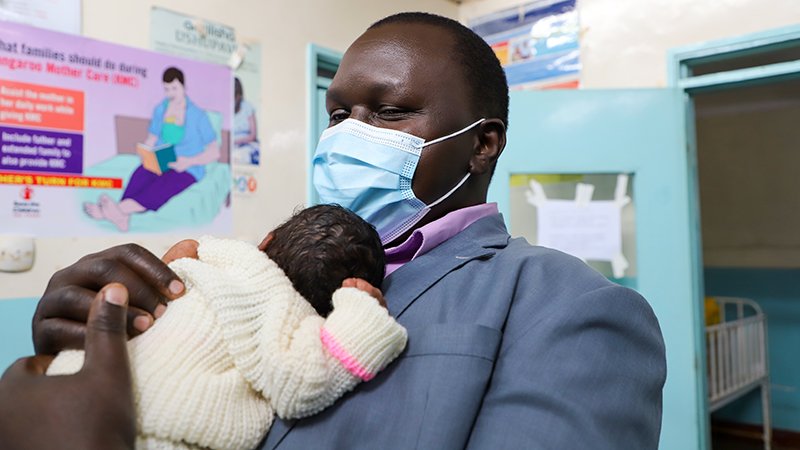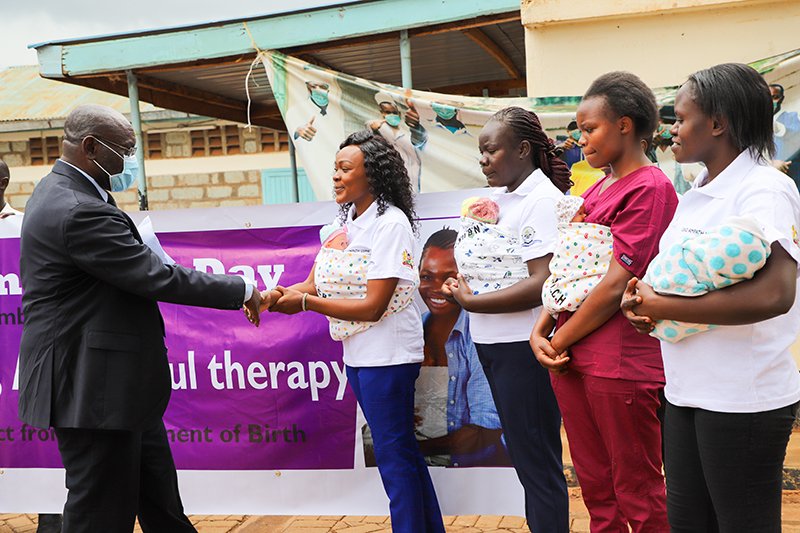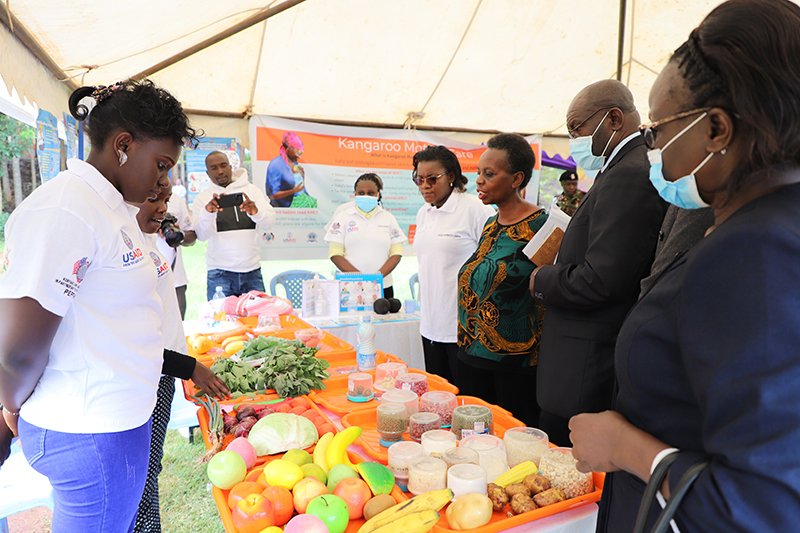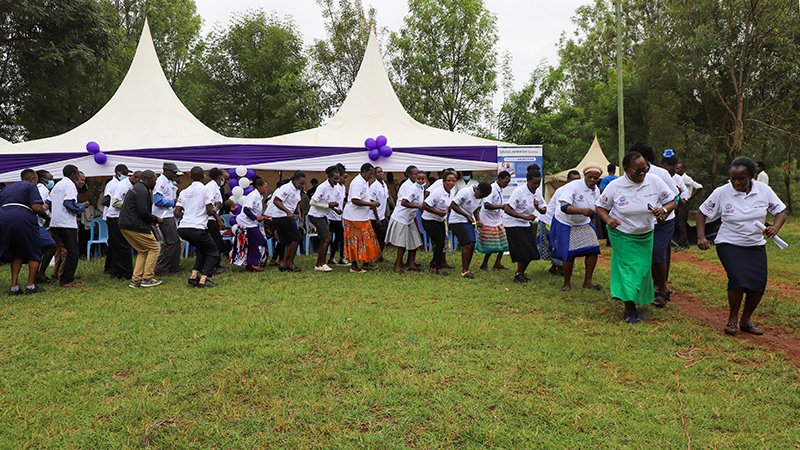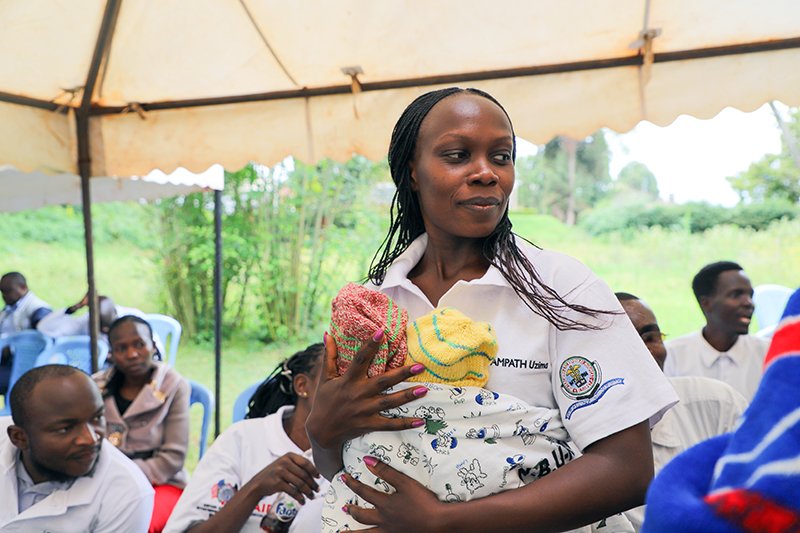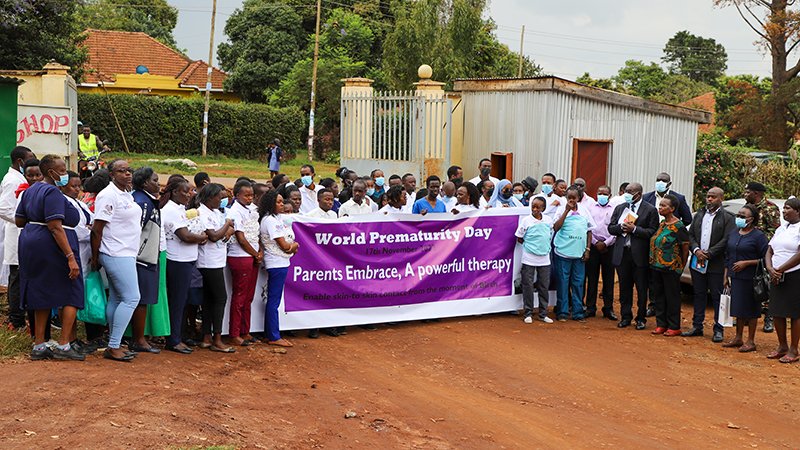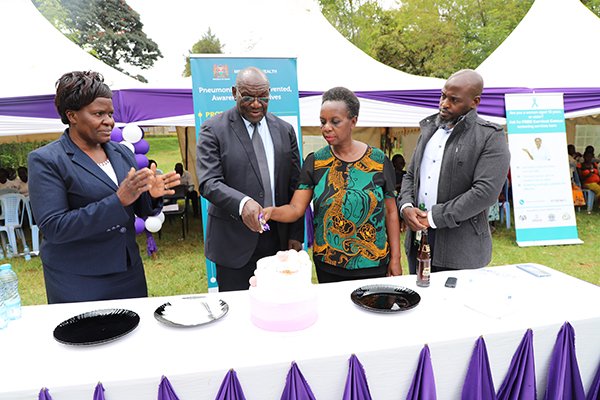World Prematurity Day Promotes Skin-to-Skin Contact for Premature Babies
The USAID AMPATH Uzima program joined in commemoration of World Prematurity Day in Kitale, Trans Nzoia County. November 17 is set aside to raise awareness of the challenges and burden of preterm birth globally. This year the aim was to promote Kangaroo Mother Care (KMC) with the theme: “A parent's embrace: a powerful therapy. Enable skin-to-skin contact from the moment of birth.”
Fathers and other caregivers can also participate in Kangaroo Mother Care (KMC).
Globally, preterm birth complications are the leading cause of death in children under the age of 5 years. An estimated 15 million babies are born preterm every year. In Africa prematurity accounts for 29 percent of newborn deaths. In Kenya, the preterm birth rate is at 12 percent or approximately 193,000 babies being born prematurely. Unfortunately, about 13,300 children die each year due to the complications of early birth and many survivors face a lifetime of disability, including learning disabilities and visual and hearing problems.
The Family Planning/Reproductive, Maternal, Newborn, Child and Adolescent Health (FP/RMNCAH) Nutrition and WASH, USAID AMPATH Uzima program, Trans Nzoia County Health Department, Health Care Workers from the Kitale County Referral Hospital, Community Health Volunteers, Kangarooo Mother Care Champions and residents of Kitale town came together to learn more about prematurity through mass media advocacy, a procession march, skits, keynote address and health talks. Champion mothers, who had their children preterm, also gave their testimonials encouraging those who have preterm children to embrace skin-to-skin care (KMC).
Kangaroo Mother Care is a method of holding a baby that involves skin-to-skin contact. The baby should typically be naked except for a diaper and is placed in an upright position against a parent’s bare chest. The skin-to-skin contact helps stabilize the baby’s heart rate, improves baby’s breathing pattern and makes the breathing more regular. It also improves oxygen saturation levels to the infant’s organs and tissues. The baby gains sleep time, decreases crying and has more successful breastfeeding episodes. Mothers attest that their babies experience more rapid weight gain resulting in earlier hospital discharge. Researchers found that babies who were held close to their mothers’ bodies for large portions of the day not only survived but thrived. In addition to the mother, the father and other family members can participate in and support KMC.
Ms. Namisi, mother to J Saviour who is now 1.5 years old, recounts her experience. “Saviour was born at 29 weeks only weighing 1.3 kg (about 2.8 lbs.). I stayed in the hospital’s Newborn Unit (NBU) for two months. The biggest challenge for me was the stress, seeing all the tubes that the baby had to be fed through and the many injections that my son had to endure. With these fears, I naturally could not get enough milk for my son, and we had to result to formulae milk which was quite pricy. I am lucky that I got my husband’s support. When my son was stronger and I transitioned to the KMC unit, I noticed a rapid weight gain and sure enough we were out of hospital in no time. Now, Saviour is so fast and healthy! I wish to encourage any mother going through this to take heart and avoid being worried. It will be okay!” Indeed, J Saviour stole the show at the World Prematurity Day celebration running all over the venue.
A mother of 2-month-old twins, Hailey and Bailey, explained to all in attendance how skin-to-skin contact is helping her little ones improve. Born at 32 weeks and weighing 1.5 kg (about 3.3 lbs.) the twins had to stay in the hospital for 19 days to deal with the breathing complications due to preterm birth.
“I am glad that after the twins had stable breathing KMC helped them gain weight very fast. Now they weigh 2.7 (almost 6 lbs.) and 2.5 kgs (more than 5.5 lbs.). Before I would give the skin-to-skin contact care together but they are quite big and heavy, so we do it together with my husband,” she said.
Many of the preterm mothers share the emotional challenges and stress. For some though, it may be worse because they do not get partner support due to misconceptions about prematurity.
The procession was launched by the County Executive Committee member (CEC) for health, Dr. Joseph Pepela, and graced by County Director of Medical Services Dr, Nancy Kegode, Medical Superintendent Kitale County hospital, Dr. Francis Soita, and Ms. Anne Kipsuto, USAID AMPATH Uzima, FP/RMNCAH, Nutrition, and WASH program manager.
USAID AMPATH Uzima in collaboration with the County Government supports the department of health to reduce preventable causes of child and maternal morbidity and mortality. This includes initiatives to drive demand and mobilize communities to access and utilize facility maternal and child health services, address barriers and empower communities to make informed choices. At the facility level, the program supports staff capacity building and minor equipment support to improve service quality, focusing on the first 1,000 days. The program will continue engaging the health department at all levels to plan, implement, coordinate and monitor the provision of maternal and child health services for improved health outcomes in the communities.




